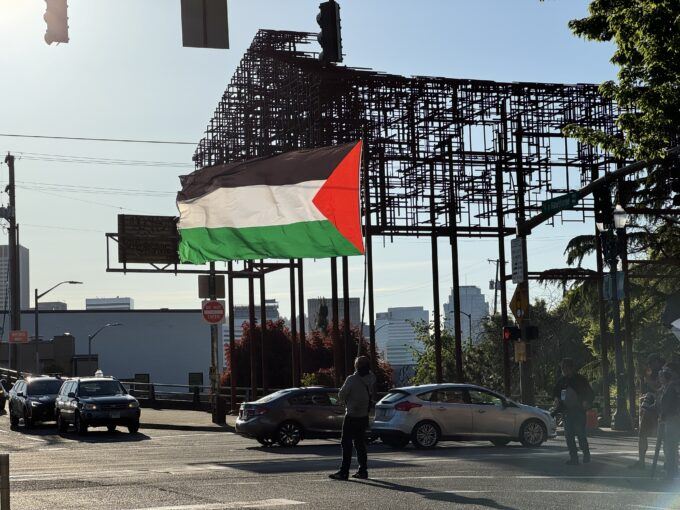Finding the Moral Courage to Recognize a Genocide

Silence in the face of a polio epidemic
Last week, Gaza’s Ministry of Health announced the detection of poliovirus in sewage water samples, placing residents at significant risk of contracting this highly infectious virus. Despite a 99% decline in global polio cases since 1988 due to extensive vaccination campaigns, the eradication of polio is now under threat. The ongoing conflict in Gaza, characterized by Israeli military actions that have damaged or destroyed water infrastructure, has exacerbated conditions conducive to the spread of diseases. Limited access to clean drinking water, poor hygiene, overcrowding, and disruptions to childhood immunizations, including boosters, all contribute to this public health crisis.
In response to this alarming development, U.S. medical professional organizations have remained conspicuously silent. On November 3, the American Public Health Association (APHA) issued a statement recognizing Israel’s right to self-defense but failed to address the 16-year blockade of Gaza and its devastating humanitarian impact. The APHA referred to the situation as a “growing humanitarian crisis arising from limited access to basic human necessities” without mentioning the ongoing bombing campaign targeting civilians in Gaza. Less than two weeks later, the same organization issued a one-sentence call for an immediate ceasefire in the “Hamas-Israel war.”
On November 11, the American Medical Association’s (AMA) House of Delegates declined to consider a resolution co-sponsored by the Minority Affairs Section supporting a ceasefire in Israel and Palestine. Former AMA president, Andrew Gurman, MD, stated, “This resolution deals with a geopolitical issue, which is in no way the purview of this house,” emphasizing that their role is to address issues facing doctors and patients in the U.S. This stance contrasts sharply with the AMA’s previous condemnation of attacks on healthcare workers and facilities in Ukraine, where it called for an “immediate ceasefire and an end to all attacks on health care workers and facilities.”
Why are medical professional organizations staying silent?
As reported in MedPage, nine months into the genocide, the AMA passed a resolution calling for peace in Israel and Palestine but still refrained from demanding a ceasefire. In April, the World Medical Association (WMA), alarmed by the escalating healthcare and humanitarian crisis in Gaza, including starvation and lack of medical care, unanimously passed a resolution calling for a “bilateral, negotiated, and sustainable ceasefire,” with support from the Israeli Medical Society.
A compelling article published by Mondoweiss, an online journal providing analysis on Palestine, Israel, and the U.S., questioned the silence of U.S. public health institutions amidst a genocide financially and ideologically supported by their own government. The author suggested several reasons: a failure to recognize the root causes of health disparities driven by colonialism, imperialism, and racial capitalism; a history of harm inflicted by U.S. medical institutions on marginalized communities; and the substantial investments of U.S. universities in the weapons industry.
I propose an additional explanation. For too long, U.S. physicians have been blind to the paradox within our training and healthcare system. As Eric Reinhart argues in a JAMA Commentary published last year, medical education has been political, but in a manner that is “overwhelmingly conservative, profoundly uncritical, and reflexively protective of an ethically bankrupt field that has spent a century building up a capitalist healthcare industry.” This has led doctors and medical students to accept and uphold a for-profit, market-driven healthcare system that often disregards how politics shapes our profession.
Medical professionals must speak out
Given this context, it is perhaps unsurprising that many health professionals lack the moral courage to acknowledge a genocide. However, we must demand more from our professional associations. They should call for an immediate ceasefire, safe and unrestricted humanitarian access to Gaza, the evacuation of urgent medical cases including children with family members, the protection of civilian infrastructure, and an end to the transfer of weapons and ammunition to Israel. These actions are essential to uphold our ethical obligations and avoid complicity in what UN experts describe as potential serious violations of human rights and international humanitarian laws.
The medical community must rise to the occasion, recognizing and addressing the genocide in Gaza, which today includes a potential polio epidemic, with the urgency and moral clarity it demands. We cannot afford to remain silent in the face of such profound suffering and injustice.
Dr. Ana Malinow is a retired pediatrician, who has dedicated her career to serving immigrant, refugee, and marginalized children. She has written extensively on U.S. health care policy. She co-leads National Single Payer.
Photograph by Nathaniel St. Clair
No comments:
Post a Comment